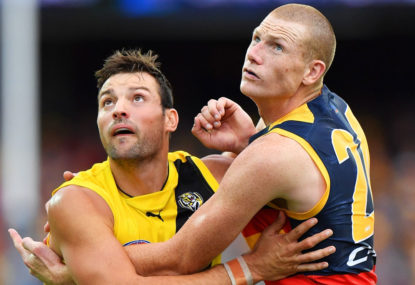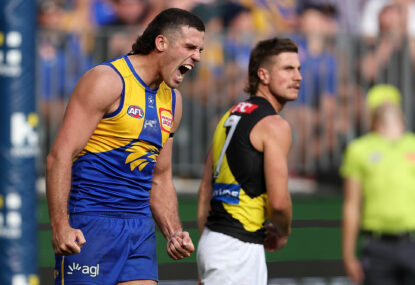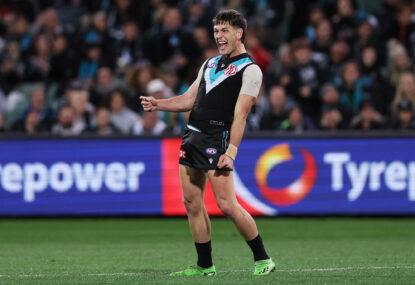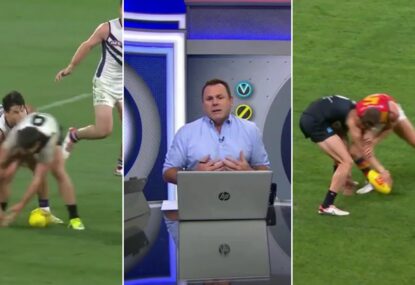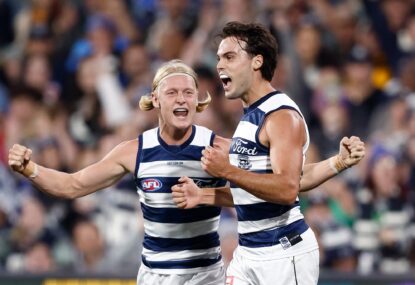In a Friday night tale that 17 other AFL clubs have become all too familiar with Richmond were simply too good, defeating Adelaide at the MCG by 47 points in a second grand final rematch.
Richmond has now recorded 17 consecutive victories at the MCG, equalling the all-time record set by Melbourne in the 1950s.
While the night belonged to the Tigers at the final siren, in the opening chapter of the encounter it seemed far from a certainty, with the Crows snatching the early advantage in the first ten minutes.
From the first bounce and driven by the midfield Adelaide was lethal, pushing ahead with the first goal of the game off the back of a brilliant and well-crafted plan to dominate in three central categories: clearances, contested possessions and hit-outs.
Adelaide set out to deprive Richmond of first use of the ball at congestion in every position on the ground. As a result Richmond was forced to suit up defensively in every play and was unable to slip into any sort of forward momentum.
The Crows pushed ahead early in these three areas and were rewarded on the scoreboard while at the other end Richmond looked flat with each inside 50 as uninspired as the last.
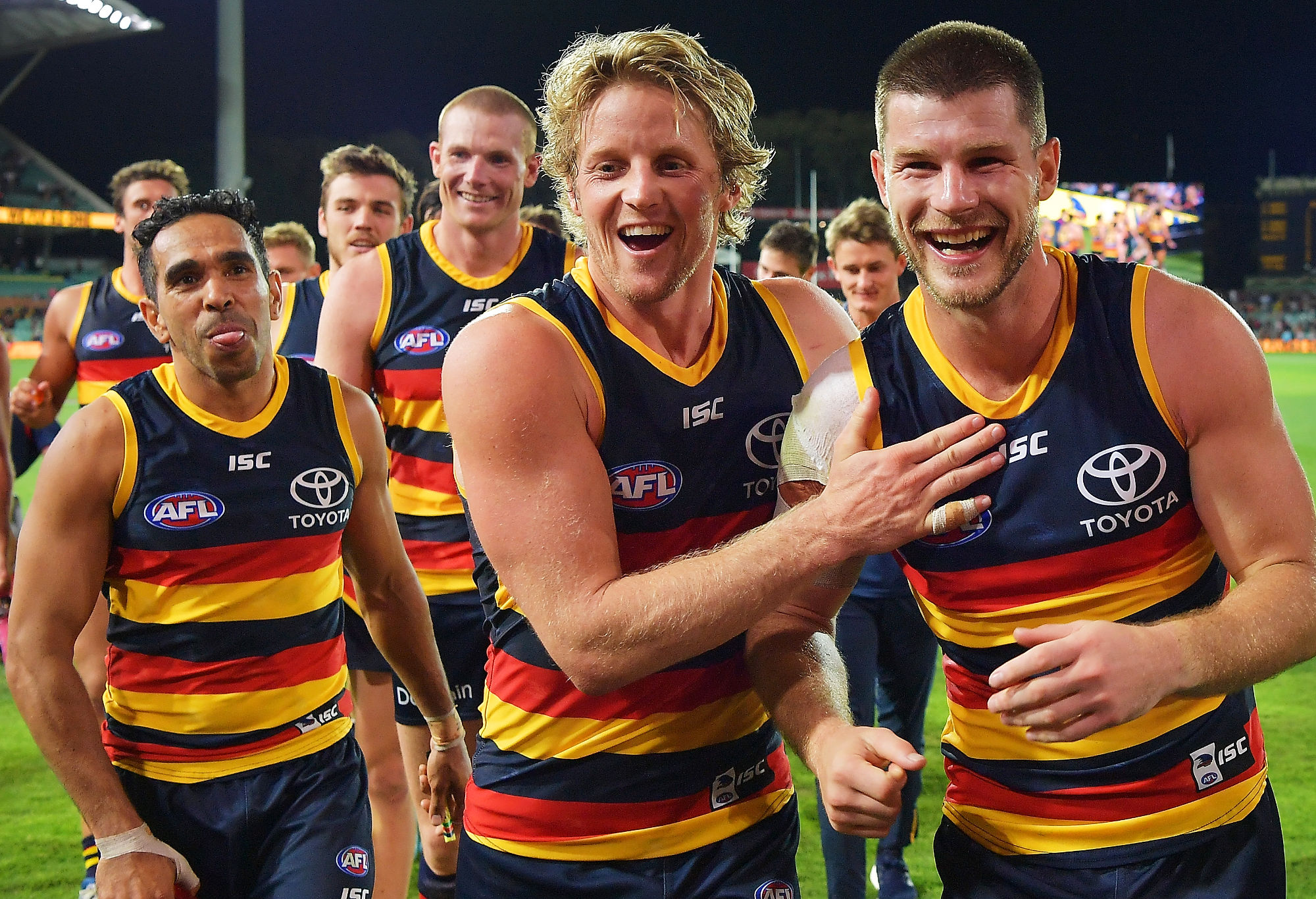
(Daniel Kalisz/Getty Images)
The problem for the Crows? The aforementioned approach proved dangerously unsustainable, with the midfield visibly exhausted as the term dragged on and Richmond slowly but surely took advantage of that fatigue and booted two goals to grab the lead.
From that point on Adelaide rarely looked within reach of Richmond and the team’s fate was sealed, now sitting three games outside of finals contention and with time on the clock all but expired.
At the end of the match Richmond took over in the contested possessions division easily, leading 165-151 and nearly evened up the clearances overall, trailing Adelaide 41-37.
Adelaide recorded a 50-32 advantage in the ruck via Sam Jacobs in another impressive night for the big unit.
Compare these figures to Richmond’s two other encounters with South Australian sides in 2018.
In Richmond’s first loss of the season – Round 2 against Adelaide – the Tigers were belted in the contested possessions 192-144 and lost the clearances 40-37. The hit-outs fell Adelaide’s way comfortably, 48-26.
In Richmond’s third loss of the season – Round 12 against Port Adelaide – the Tigers were crucified in contested possessions 187-154, in the clearances 49-35 and in the hit-outs 56-34.
The only visible outlier here is Richmond’s second loss of the season – Round 9 against West Coast – when the Tigers only narrowly lost the contested possessions count 135-132 while also winning the clearances 36-32. The hit-outs remained a similar story, with the Eagles winning 50-23.
In summary, central to victory in two of the three losses the Tigers have suffered this season has been domination in contested footy, and in all three losses the Tigers have been crushed in the ruck.
When quality sides are able to deprive the Tigers of first use of the ball it’s possible to force them to stagnate. The only issue is that because of the Tigers’ seemingly endless waves of defensive pressure, maintaining this advantage is impossible for most of the league.

(AAP Image/Hamish Blair)
From a gameplay perspective Richmond’s evolved handball was once again the thing to behold.
Like no other side in the competition Richmond is totally comfortable rolling the dice on forwards movement through congestion via handballing and the team’s ability to find space in the most non-linear of ways is breathtaking.
The king of the forward handball remains Shane Edwards, continuing his scintillating form of recent rounds past.
Richmond recorded 214 handballs on Friday night, leading the Crows with just 173.
As a consequence of the side’s decision to bounce the ball back and forth through the middle of the ground all of Richmond’s core midfielders managed to record more than 26 disposals, an unusual occurrence for a side that prides itself on tearing teams apart with fewer than 360 disposals total.
Kane Lambert led the way with 33 touches, with Dustin Martin not far behind with 30 and with Shaun Grigg, Dion Prestia and Shane Edwards with 28. Trent Cotchin and Brandon Ellis both managed 27, while defender Jayden Short and forward Jack Higgins were both happy with 25.
On the outer to this was wingmen Jack Graham with 17, leaving the game early via injury, and VFL promotion Corey Ellis with 13. Ellis is a player with silky skills who is often criticised for his inability to find the ball at a high enough volume.
Tom Doedee and Bryce Gibbs were both terrific for thee Crows. However, on the other end of the pendulum Matt Crouch, Rory Laird and Rory Sloane showed plenty of glimpses but felt largely ineffective. That’s not to say that those three were anything close to poor, but a time comes when you need to question just how damaging a player’s 30-disposal haul really is.
[latest_videos_strip category=”afl” name=”AFL”]
Where do we go from here? Well, if I had a time machine, I tell you what, I’d be skipping ahead to that Round 19 fixture between Richmond and Collingwood at the MCG.
With Collingwood ruck Heath Grundy in the form of his young career he’s more than capable of giving his side the advantage in hit-outs they’ll need to come close to beating Richmond – it’ll just be a question of which of the two teams’ premium midfields is able to get ahead in clearances and contested possessions.
Regardless of what happens it’s sure to be one hell of match. And for the Crows? A match-up with Geelong next round really is the last chance to make a mark, and if recent history is anything to go by, if you can’t make top four, it doesn’t really matter anyway.





























































































